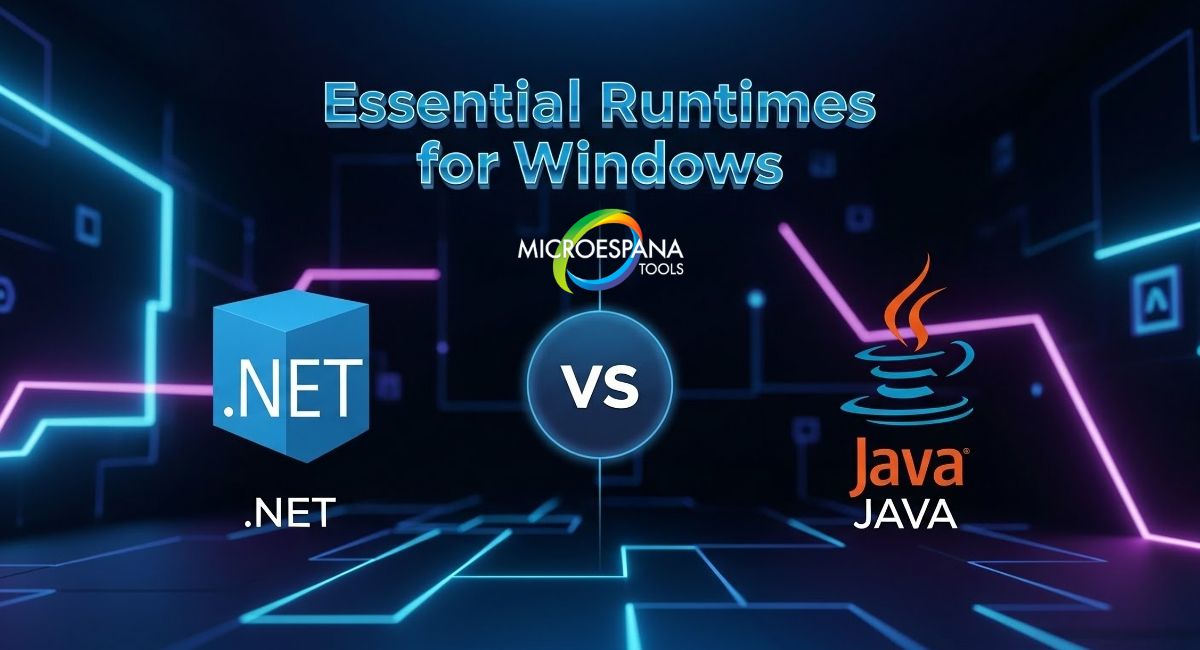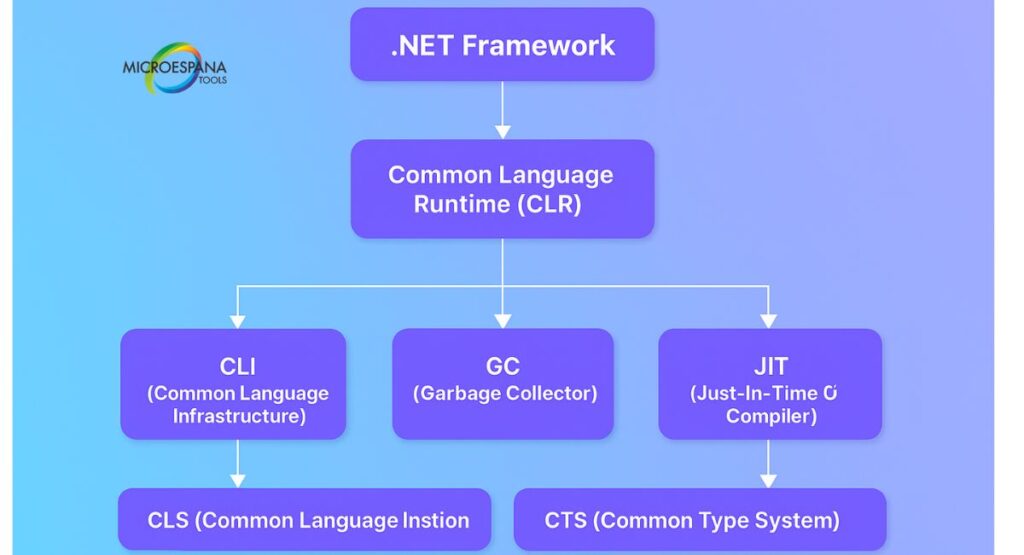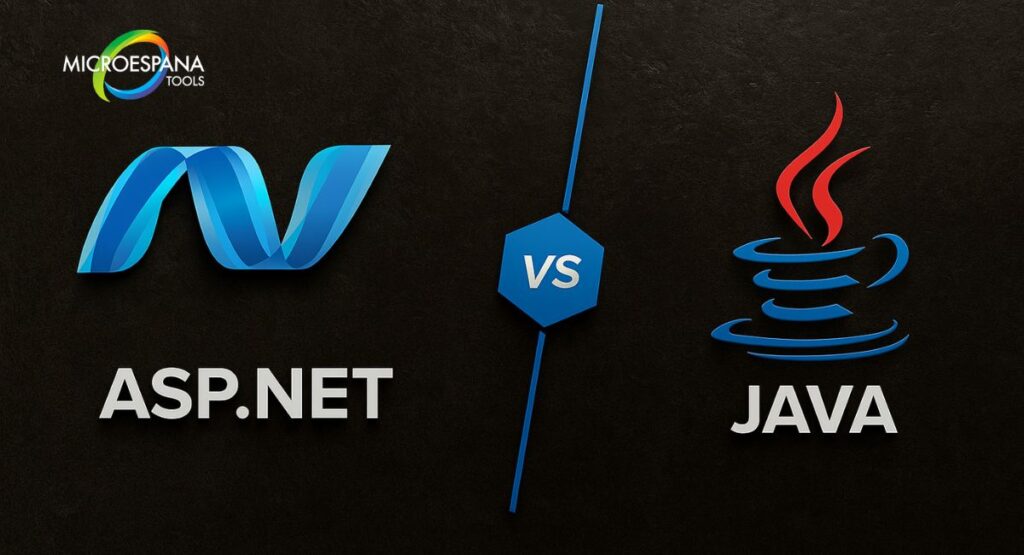
Essential Runtimes for Windows: .NET, Java, and More
Introduction to .NET and Java
Modern software relies on essential runtimes (.NET, Java) to deliver smooth and reliable performance across Windows systems. These runtimes act as the foundation that powers applications ranging from enterprise applications to dynamic web services and interactive desktop applications. The .NET framework developed by Microsoft offers deep integration with Windows and strong developer tools, while the JAVA programming language provides unmatched platform independence through the Java Virtual Machine (JVM).
Both ecosystems support object-oriented programming, debugging, and scalability, making them indispensable for modern development. Understanding these runtimes helps businesses, developers, and IT teams choose the right path for creating powerful, future-ready applications.
Evolution of .NET Technology and Its Components
The journey of the .NET framework began in 2002 when Microsoft released it as a Windows-only platform. Over the years, it grew into open-source development with the cross-platform framework .NET Core, later unified under .NET 5, .NET 6, and .NET 7.
Its heart is the Common Language Runtime (CLR), which handles garbage collection, exception handling, and debugging and compilation. Add the Entity Framework for databases, automation monitoring, and strong migration services, and .NET becomes an essential toolkit for modern developers.

Key Features of the .NET Framework
The strength of Microsoft .NET lies in flexibility. It supports C#, F#, Visual Basic under one roof, allowing teams to choose their favorite language. Developers use Visual Studio, VS Code, and other integrated development environment (IDE) options to build software faster and smarter.
Security is another hallmark. With built-in tools for error-free applications, exception handling, and strict code verification, businesses trust .NET for safety. Strong ties to Windows make it easier to deploy desktop applications and integrate with other Microsoft services.
Understanding Java and Its Core Features
The JAVA programming language launched in the mid-1990s and became a powerhouse of object-oriented programming. Its magic lies in the Java Virtual Machine (JVM), which lets programs run anywhere without rewriting code. This cross-compatibility gave rise to its slogan “Write Once, Run Anywhere.”
Modern Java includes Java SE 17 with libraries, modules, and frameworks for every task. Developers use Eclipse, IntelliJ IDEA, NetBeans as their main integrated development environment (IDE) tools, making Java highly accessible for both beginners and experts.
.NET Programming Languages vs Java Programming Languages

The .NET framework offers language diversity. Developers switch between C#, F#, Visual Basic depending on project requirements. This choice boosts flexibility and allows offshore development teams to pick their comfort zone.
In contrast, Java sticks to one main language, which simplifies learning but limits diversity. Still, its wide JAVA developer community support and active global use keep it strong for enterprise applications and mobile applications.
Platform Dependence vs Platform Independence
Originally, Microsoft .NET was tied to Windows. With the rise of cross-platform framework versions, .NET now runs on Linux and macOS, bridging gaps and enabling .NET migration services for businesses.
Java, however, has always been platform independent. The is JAVA better than .NET for cross-platform apps debate often points to Java’s consistent history of running anywhere through the Java Virtual Machine (JVM).
Version Compatibility in .NET and Java
One of the challenges with .NET is backward compatibility. Old applications may not always run smoothly on newer runtimes, which creates headaches for companies planning upgrades.
Java has built a reputation for strong cross-compatibility. From old systems to new releases like Java SE 17, businesses enjoy smoother migrations and reduced cost of development. This is why JAVA enterprise-level application development often becomes the safer choice.
Advantages of Using .NET for Development
Microsoft .NET support and integration is a game changer. Businesses building enterprise applications benefit from native access to Microsoft tools, automation monitoring, and Entity Framework for fast database work.
Developers also enjoy premium debugging and compilation features inside Visual Studio. These tools reduce bugs, increase efficiency, and enable building error-free applications. Such strengths are why companies highlight the advantages of .NET over JAVA in projects needing deep Windows integration.
Advantages of Using Java for Development
The biggest power of Java lies in freedom. Its open-source JAVA frameworks vs .NET frameworks ecosystem ensures flexibility, while the JUnit testing framework helps developers build error-free applications with confidence.
Another strength is mobility. From desktop applications to mobile applications and cloud-based solutions, Java’s reach is unmatched. This makes the advantages of JAVA over .NET clear for projects targeting global platforms.
- Download & Convert YouTube Videos to MP4 or MP3 (Fast, Free & Easy)
- How to Screen Record & Take Screenshots on Any Device (Windows, Mac, iPhone & Android)
- Top Free Online Image Search & Editing Tools (No Signup Required)
- How to Clear Browser Cache & Search History on Chrome, Safari, Edge & Firefox
- Best Instagram Story Viewer and Downloader Tools (Watch Stories Anonymously in 2026)
Disadvantages and Limitations of .NET
While .NET is strong, challenges remain. Historically, it was locked to Windows, limiting cross-platform adoption until recently. The cost of development also rises because premium licenses and tools can be expensive.
Another issue is complexity. Developers sometimes face steep learning curves, and .NET developer salary USA is often higher than average, which increases costs for businesses when compared to the cost of hiring JAVA developers vs .NET developers.
Disadvantages and Limitations of Java
Java also has weak spots. Performance often lags behind compiled native code, sparking constant JAVA vs .NET performance comparison debates. Its verbose syntax requires more code for simple tasks, making development slower.
Memory use is another drawback. Heavy reliance on the Java Virtual Machine (JVM) can increase resource consumption, impacting scalability and performance. The speed comparison between JAVA and .NET usually shows .NET as faster in some enterprise settings.
How to Choose Between .NET and Java for Your Next Project?
Choosing depends on project needs. For JAVA vs .NET for web development, Java wins with portability while .NET shines with Microsoft integration. For JAVA vs .NET for cloud-based solutions, both have strengths depending on platforms like Azure or AWS.
Case studies in the USA show banks preferring .NET migration services for businesses, while global e-commerce firms lean on JAVA enterprise-level application development for their worldwide reach. The decision often boils down to budget, tools, and future goals.
Quick Comparison Table
| Factor | .NET | Java |
|---|---|---|
| Platform Support | Strong with Windows, now cross-platform | Cross-platform from start |
| Development Cost | Higher, .NET developer salary USA is costly | Lower with wide offshore development teams |
| Tools | Visual Studio, VS Code | Eclipse, IntelliJ IDEA, NetBeans |
| Performance | Faster in many enterprise apps | Reliable but sometimes slower |
| Community | Large but smaller than Java | Huge JAVA developer community support |
Conclusion: Which One Is Better – Java or .NET?
The answer to which is better JAVA or .NET is not simple. .NET integrates seamlessly with Microsoft, offering advanced tools and error-free applications. Java provides unmatched portability and a thriving open-source ecosystem.
The real choice depends on the project. For JAVA vs .NET for cloud-based solutions or .NET vs JAVA scalability for enterprise apps, businesses must consider budget, reach, and platform needs. Both runtimes remain vital to the future of application servers, enterprise applications, and modern development.
Is JAVA better than .NET for cross-platform apps?
Yes, Java was designed for platform independence from the start.
What are the advantages of .NET over JAVA?
Strong integration with Microsoft, faster runtime, and premium tools.
What are the advantages of JAVA over .NET?
Huge community, portability, and diverse frameworks.


[…] With Windows 10 support ending in October, these tools are optimized for Windows 11, macOS, and Linux. Check More Here: Essential Runtimes for Windows: .NET, Java, and More […]